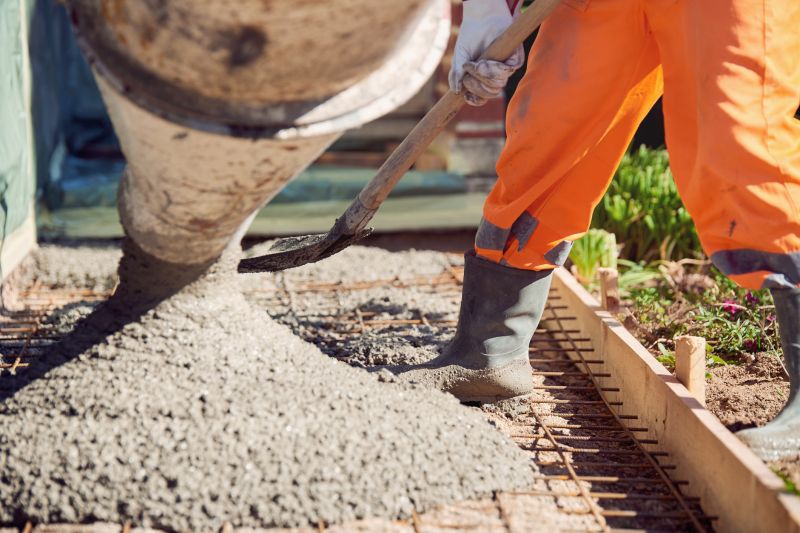Ultimate Guide to Essential Products for Concrete Installations
Learn about the top tools and materials that ensure efficient, precise, and durable concrete work for all project sizes.
 Concrete installation projects in Indio, CA, require a variety of specialized products to ensure durability, safety, and a professional finish. From foundational work to decorative finishes, selecting the right tools and materials is essential for successful outcomes. Proper preparation and the right products can help achieve a smooth surface, secure anchoring, and long-lasting results. Whether constructing a new patio, driveway, or structural element, understanding the available product options can facilitate better decision-making and project planning.
Concrete installation projects in Indio, CA, require a variety of specialized products to ensure durability, safety, and a professional finish. From foundational work to decorative finishes, selecting the right tools and materials is essential for successful outcomes. Proper preparation and the right products can help achieve a smooth surface, secure anchoring, and long-lasting results. Whether constructing a new patio, driveway, or structural element, understanding the available product options can facilitate better decision-making and project planning.
Top Overall Option
Concrete Mix for Structural Foundations
A high-quality concrete mix designed for structural foundations offers a reliable base for various construction projects. It provides good workability, strength, and durability, making it suitable for slabs, footings, and load-bearing elements. Choosing a versatile mix can help streamline the installation process and ensure long-term performance in different environmental conditions.
Types of Products For Concrete Installations
Concrete Mixes
Various mixes tailored for specific applications such as foundations, slabs, or decorative finishes.
Reinforcement Materials
Rebar, wire mesh, and fiber reinforcements to enhance structural strength.
Formwork and Molds
Temporary or permanent forms used to shape and support concrete during setting.
Concrete Vibrators
Tools used to eliminate air bubbles and ensure proper compaction of poured concrete.
Finishing Tools
Trowels, floats, and edgers for smoothing and shaping concrete surfaces.
Curing Compounds
Products that retain moisture and promote proper curing to prevent cracking.
Sealants and Surface Treatments
Protective coatings to enhance durability and appearance of finished concrete.
Expansion Joints
Materials that accommodate movement and prevent cracking due to temperature changes.
Anchors and Fasteners
Hardware for attaching fixtures or structural elements to concrete surfaces.
Concrete Pumps and Delivery Equipment
Machinery used for efficient placement of large volumes of concrete.
Surface Texturing Tools
Tools for creating slip-resistant or decorative textures on concrete surfaces.
Concrete Repair Products
Patch compounds and crack fillers for maintenance and restoration.
Waterproofing Membranes
Materials that prevent water ingress and protect concrete structures.
Form Release Agents
Products that facilitate removal of forms without damaging the concrete surface.
Concrete Admixtures
Additives that modify setting times, workability, or durability of concrete.
Popular Choices
Pre-mixed concrete delivered to the site for convenience and consistent quality.
Reinforcing materials to improve structural integrity in various projects.
Hand tools for finishing and smoothing freshly poured concrete.
Coverings used to retain moisture during curing in warm climates.
Material used to fill joints and allow for movement.
Equipment to ensure proper consolidation of poured concrete.
Protective coatings to enhance surface durability and appearance.
Agents that facilitate form removal and surface quality.
Products designed for small repairs and maintenance.
Materials that help prevent water penetration in concrete structures.
Additives to modify concrete properties for specific needs.
Tools for creating textured or patterned concrete surfaces.
Equipment for adding slip-resistant or aesthetic textures.
Hardware for attaching fixtures securely to concrete.
Machinery for efficient concrete placement in large projects.
Methods for maintaining optimal moisture during curing.
Concrete installation involves multiple steps, including mixing, pouring, leveling, curing, and finishing. Each phase demands specific products designed to meet the demands of the task. For example, high-quality concrete mixes provide the base for strong structures, while tools like trowels and floats help achieve a smooth surface. Reinforcement materials such as rebar or wire mesh are crucial for structural integrity, especially in load-bearing applications. Additionally, curing compounds and sealants help protect the concrete during the critical initial setting period, promoting longevity and resistance to cracking.
In the context of Indio, CA, where the climate can influence curing times and material performance, selecting products that are suited for warmer temperatures is important. Properly chosen products can mitigate issues like rapid drying or cracking caused by heat. Investing in durable, weather-resistant materials and tools ensures that installations withstand the local environment and maintain their integrity over time. Knowledge of product specifications and compatibility is vital for achieving optimal results and avoiding costly rework.
Key Buying Considerations
- Determine the specific application and select products suited for that purpose.
- Consider the climate and temperature conditions in Indio, CA, to choose appropriate materials.
- Evaluate the workability and curing time of concrete mixes to match project timelines.
- Assess the strength and durability requirements based on structural needs.
- Choose reinforcement materials compatible with the concrete mix and project specifications.
- Look for tools and equipment that facilitate efficient and precise work.
- Verify the compatibility of admixtures and surface treatments with other products used.
- Consider ease of use and safety features of tools and machinery.
- Review product specifications for resistance to local environmental factors such as heat and moisture.
- Factor in long-term maintenance and repair needs when selecting surface protection products.
- Determine the size and volume of materials needed to avoid shortages or excess.
- Check for availability of replacement parts or accessories for equipment.
- Prioritize products from reputable suppliers to ensure quality and consistency.
- Evaluate the cost-effectiveness of different product options relative to project scope.
- Ensure proper storage and handling requirements are met for sensitive materials.
